Marketing Essentials: Roles, Responsibilities & Organizational Context
VerifiedAdded on 2023/06/18
|10
|882
|392
Report
AI Summary
This report provides a comprehensive analysis of the key roles and responsibilities of the marketing function within an organizational context, using British Petroleum as a case study. It identifies consumer requirements, anticipates market needs, and details how marketing activities relate to the broader organizational goals. The report also examines the interrelationships between marketing and other functional units such as HRM and IT, highlighting the importance of market research and marketing planning. Ultimately, the study concludes that the marketing department significantly contributes to achieving company objectives through strategic planning and the application of marketing mix strategies, referencing Ansoff Matrix and Porter's Generic Strategies.

MARKETING ESSENTIALS
Paraphrase This Document
Need a fresh take? Get an instant paraphrase of this document with our AI Paraphraser
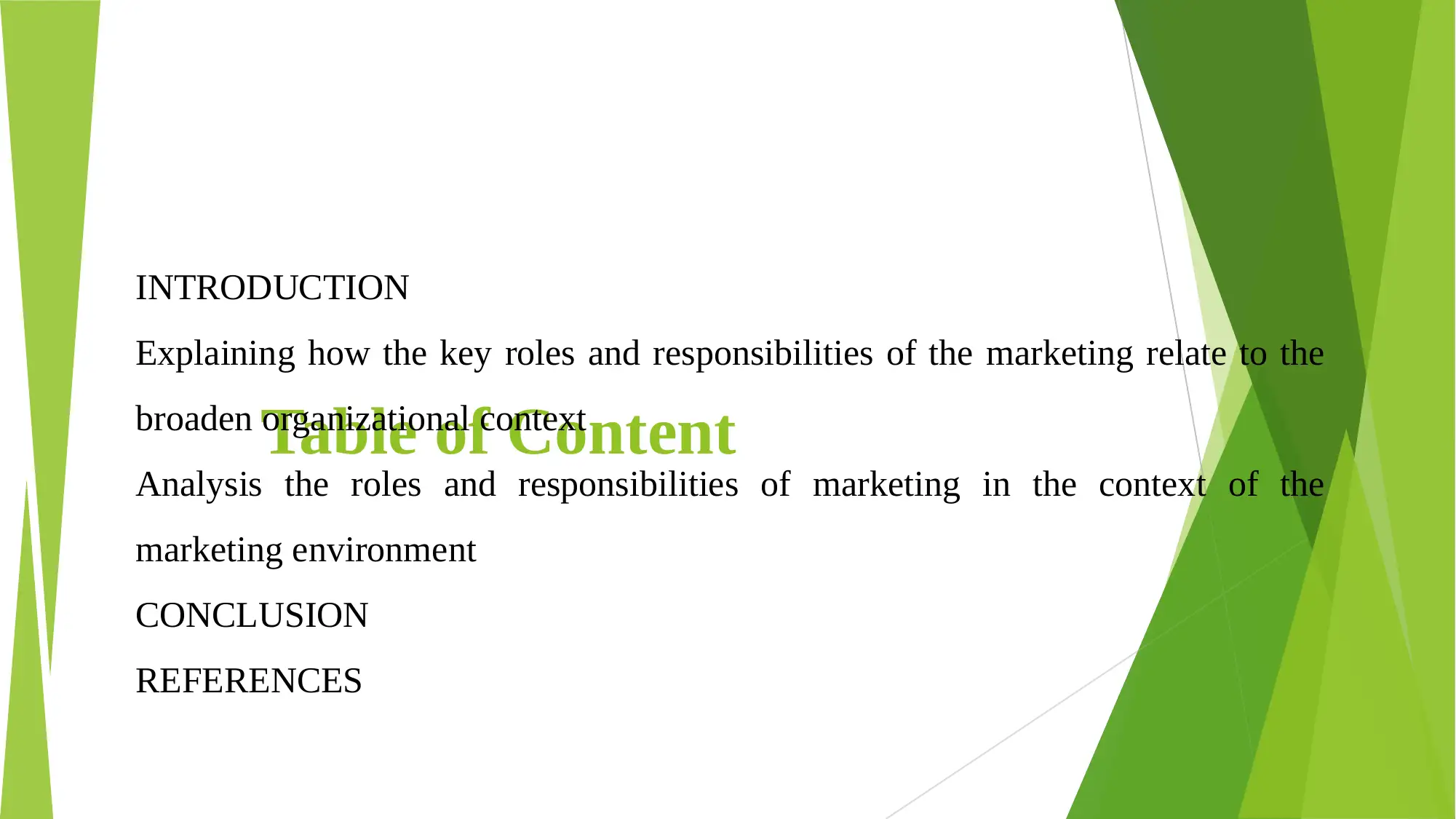
Table of Content
INTRODUCTION
Explaining how the key roles and responsibilities of the marketing relate to the
broaden organizational context
Analysis the roles and responsibilities of marketing in the context of the
marketing environment
CONCLUSION
REFERENCES
INTRODUCTION
Explaining how the key roles and responsibilities of the marketing relate to the
broaden organizational context
Analysis the roles and responsibilities of marketing in the context of the
marketing environment
CONCLUSION
REFERENCES
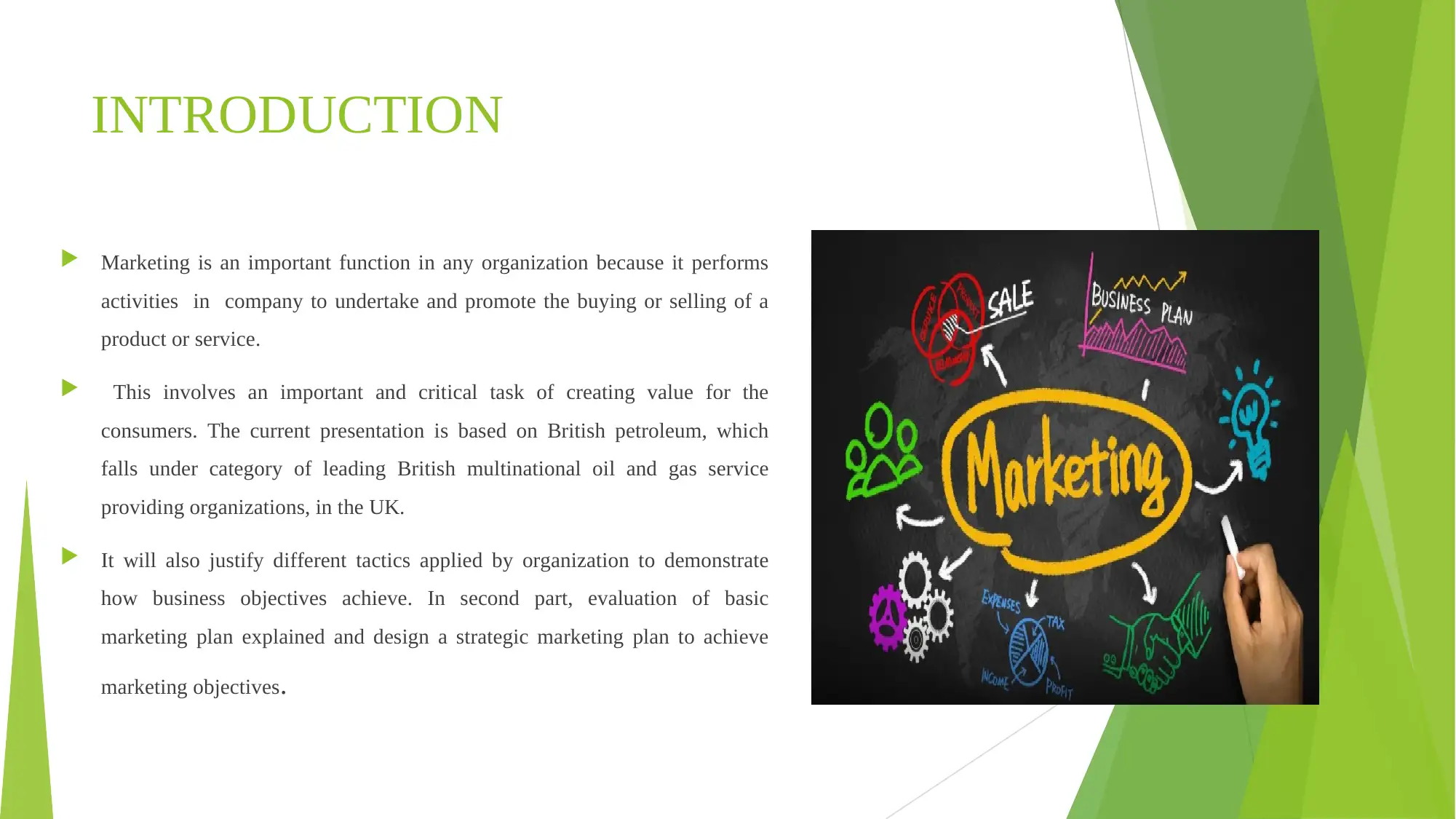
INTRODUCTION
Marketing is an important function in any organization because it performs
activities in company to undertake and promote the buying or selling of a
product or service.
This involves an important and critical task of creating value for the
consumers. The current presentation is based on British petroleum, which
falls under category of leading British multinational oil and gas service
providing organizations, in the UK.
It will also justify different tactics applied by organization to demonstrate
how business objectives achieve. In second part, evaluation of basic
marketing plan explained and design a strategic marketing plan to achieve
marketing objectives.
Marketing is an important function in any organization because it performs
activities in company to undertake and promote the buying or selling of a
product or service.
This involves an important and critical task of creating value for the
consumers. The current presentation is based on British petroleum, which
falls under category of leading British multinational oil and gas service
providing organizations, in the UK.
It will also justify different tactics applied by organization to demonstrate
how business objectives achieve. In second part, evaluation of basic
marketing plan explained and design a strategic marketing plan to achieve
marketing objectives.
⊘ This is a preview!⊘
Do you want full access?
Subscribe today to unlock all pages.

Trusted by 1+ million students worldwide
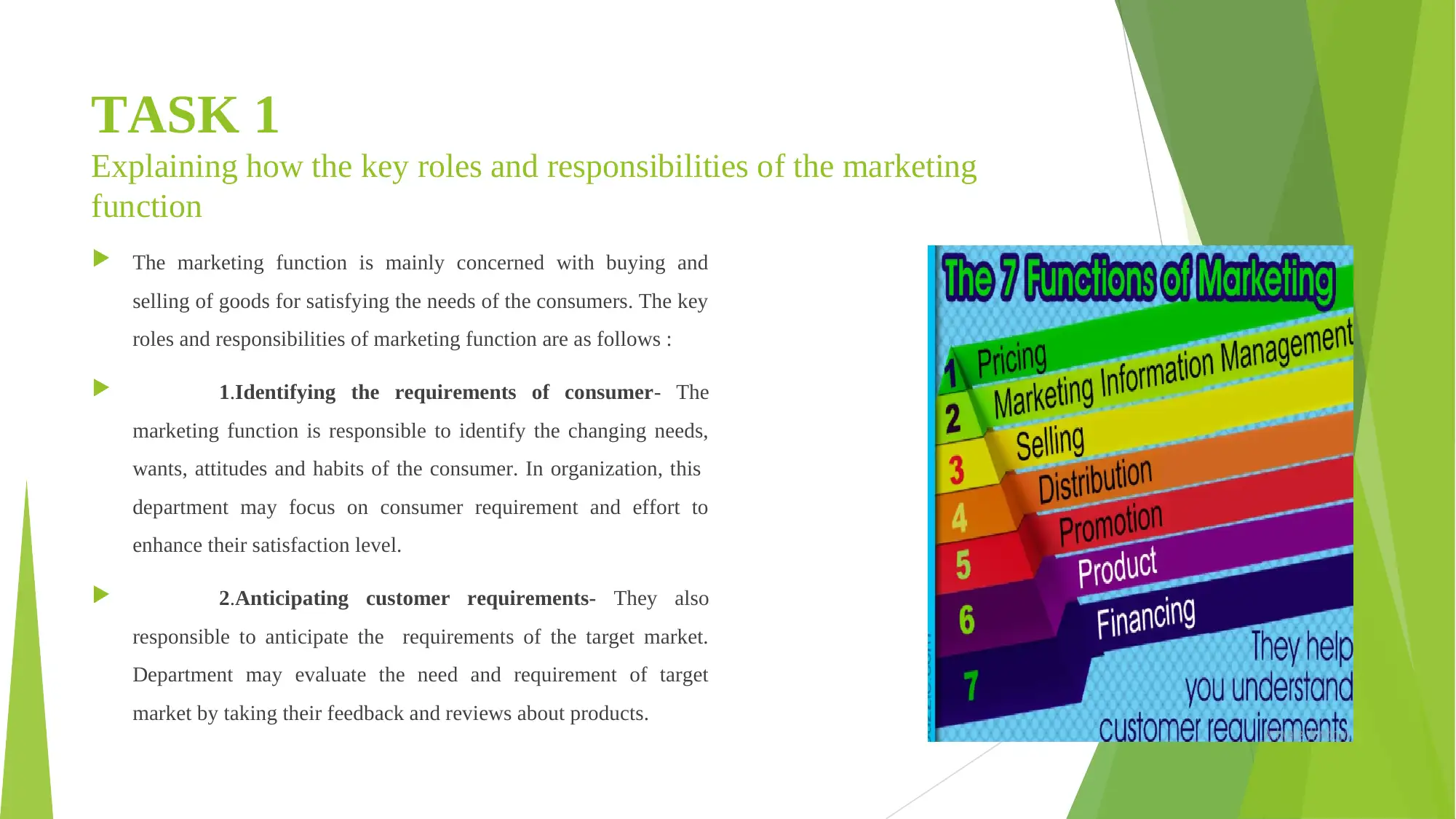
TASK 1
Explaining how the key roles and responsibilities of the marketing
function
The marketing function is mainly concerned with buying and
selling of goods for satisfying the needs of the consumers. The key
roles and responsibilities of marketing function are as follows :
1.Identifying the requirements of consumer- The
marketing function is responsible to identify the changing needs,
wants, attitudes and habits of the consumer. In organization, this
department may focus on consumer requirement and effort to
enhance their satisfaction level.
2.Anticipating customer requirements- They also
responsible to anticipate the requirements of the target market.
Department may evaluate the need and requirement of target
market by taking their feedback and reviews about products.
Explaining how the key roles and responsibilities of the marketing
function
The marketing function is mainly concerned with buying and
selling of goods for satisfying the needs of the consumers. The key
roles and responsibilities of marketing function are as follows :
1.Identifying the requirements of consumer- The
marketing function is responsible to identify the changing needs,
wants, attitudes and habits of the consumer. In organization, this
department may focus on consumer requirement and effort to
enhance their satisfaction level.
2.Anticipating customer requirements- They also
responsible to anticipate the requirements of the target market.
Department may evaluate the need and requirement of target
market by taking their feedback and reviews about products.
Paraphrase This Document
Need a fresh take? Get an instant paraphrase of this document with our AI Paraphraser
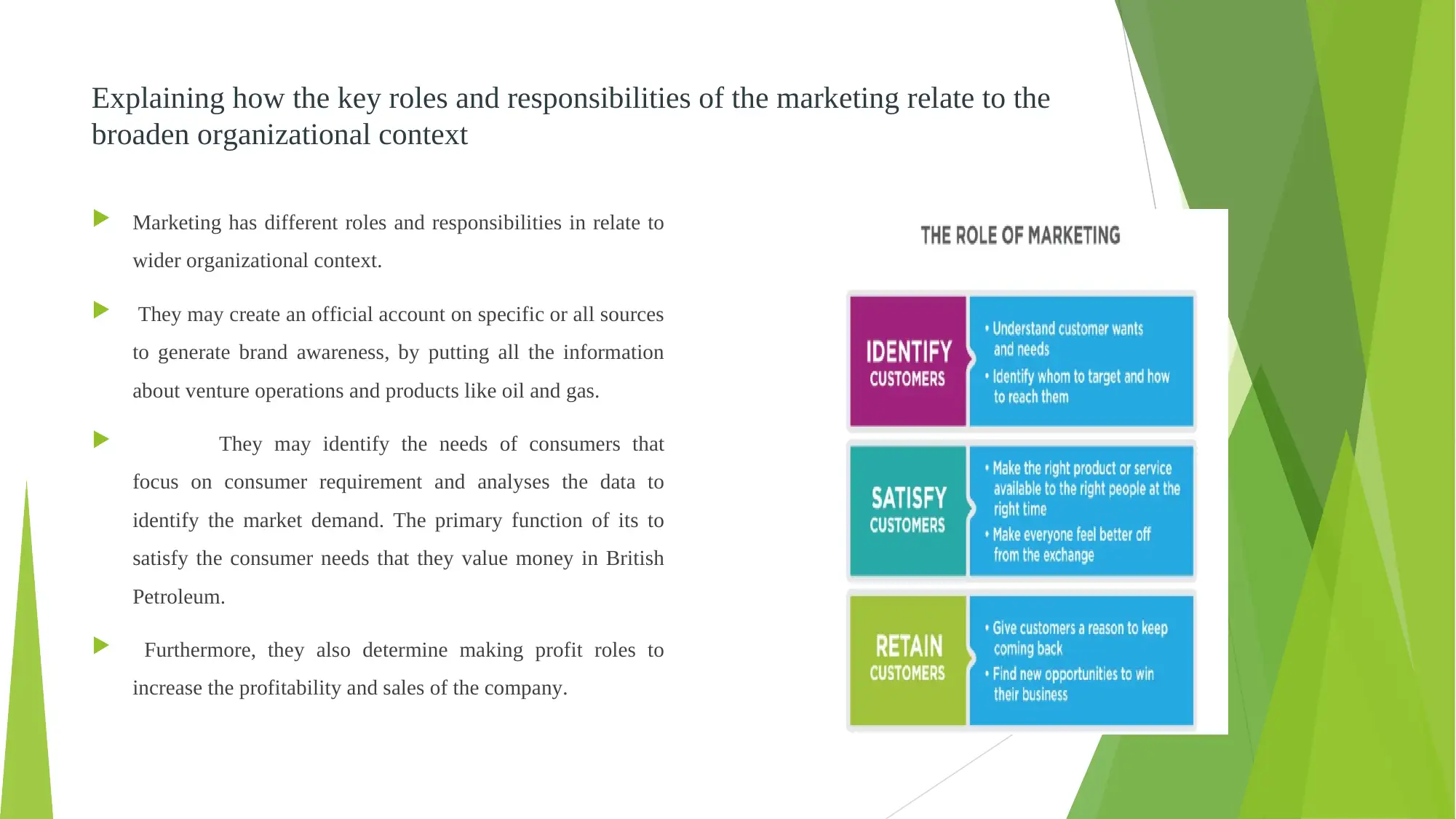
Explaining how the key roles and responsibilities of the marketing relate to the
broaden organizational context
Marketing has different roles and responsibilities in relate to
wider organizational context.
They may create an official account on specific or all sources
to generate brand awareness, by putting all the information
about venture operations and products like oil and gas.
They may identify the needs of consumers that
focus on consumer requirement and analyses the data to
identify the market demand. The primary function of its to
satisfy the consumer needs that they value money in British
Petroleum.
Furthermore, they also determine making profit roles to
increase the profitability and sales of the company.
broaden organizational context
Marketing has different roles and responsibilities in relate to
wider organizational context.
They may create an official account on specific or all sources
to generate brand awareness, by putting all the information
about venture operations and products like oil and gas.
They may identify the needs of consumers that
focus on consumer requirement and analyses the data to
identify the market demand. The primary function of its to
satisfy the consumer needs that they value money in British
Petroleum.
Furthermore, they also determine making profit roles to
increase the profitability and sales of the company.
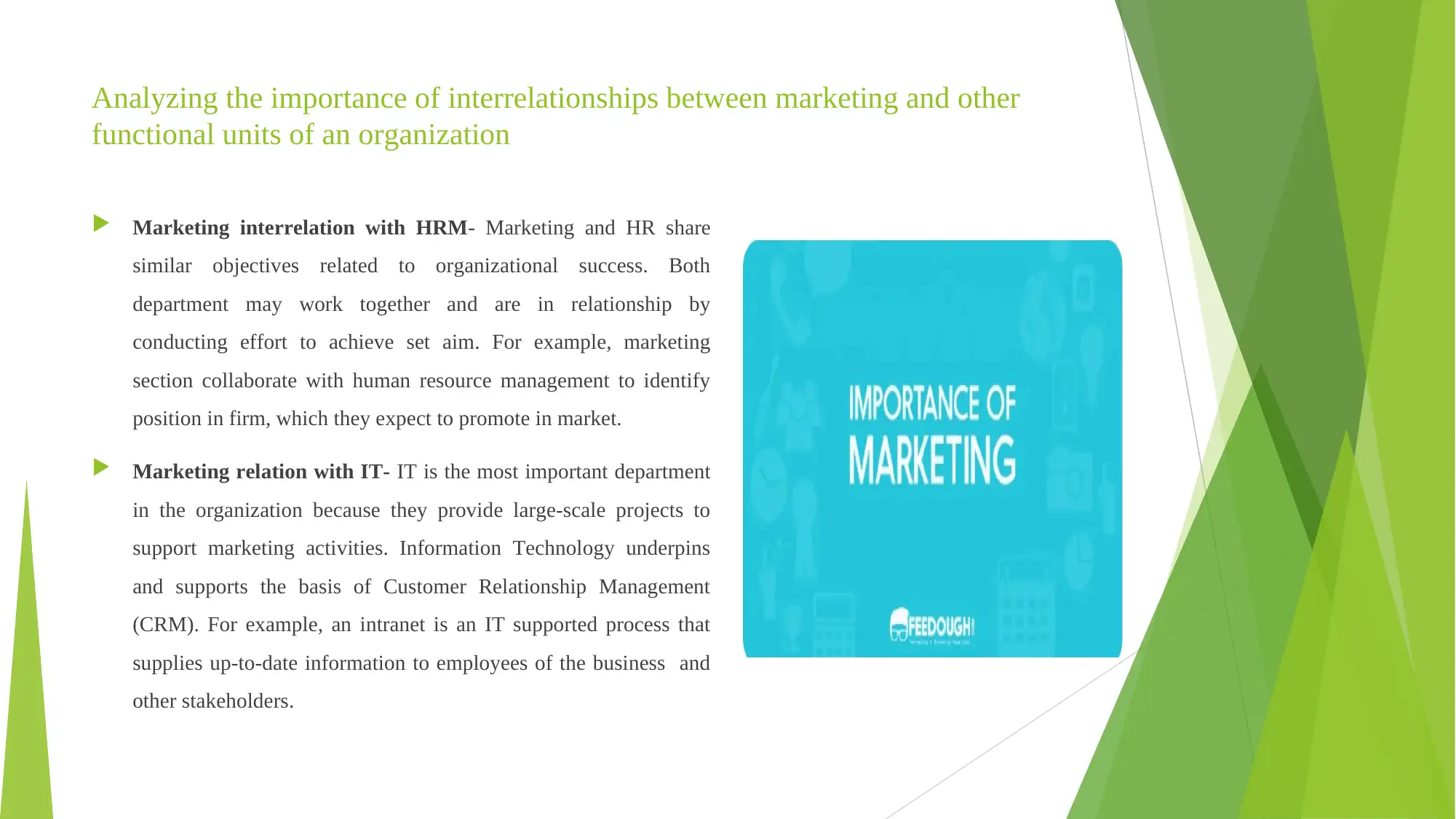
Analyzing the importance of interrelationships between marketing and other
functional units of an organization
Marketing interrelation with HRM- Marketing and HR share
similar objectives related to organizational success. Both
department may work together and are in relationship by
conducting effort to achieve set aim. For example, marketing
section collaborate with human resource management to identify
position in firm, which they expect to promote in market.
Marketing relation with IT- IT is the most important department
in the organization because they provide large-scale projects to
support marketing activities. Information Technology underpins
and supports the basis of Customer Relationship Management
(CRM). For example, an intranet is an IT supported process that
supplies up-to-date information to employees of the business and
other stakeholders.
functional units of an organization
Marketing interrelation with HRM- Marketing and HR share
similar objectives related to organizational success. Both
department may work together and are in relationship by
conducting effort to achieve set aim. For example, marketing
section collaborate with human resource management to identify
position in firm, which they expect to promote in market.
Marketing relation with IT- IT is the most important department
in the organization because they provide large-scale projects to
support marketing activities. Information Technology underpins
and supports the basis of Customer Relationship Management
(CRM). For example, an intranet is an IT supported process that
supplies up-to-date information to employees of the business and
other stakeholders.
⊘ This is a preview!⊘
Do you want full access?
Subscribe today to unlock all pages.

Trusted by 1+ million students worldwide
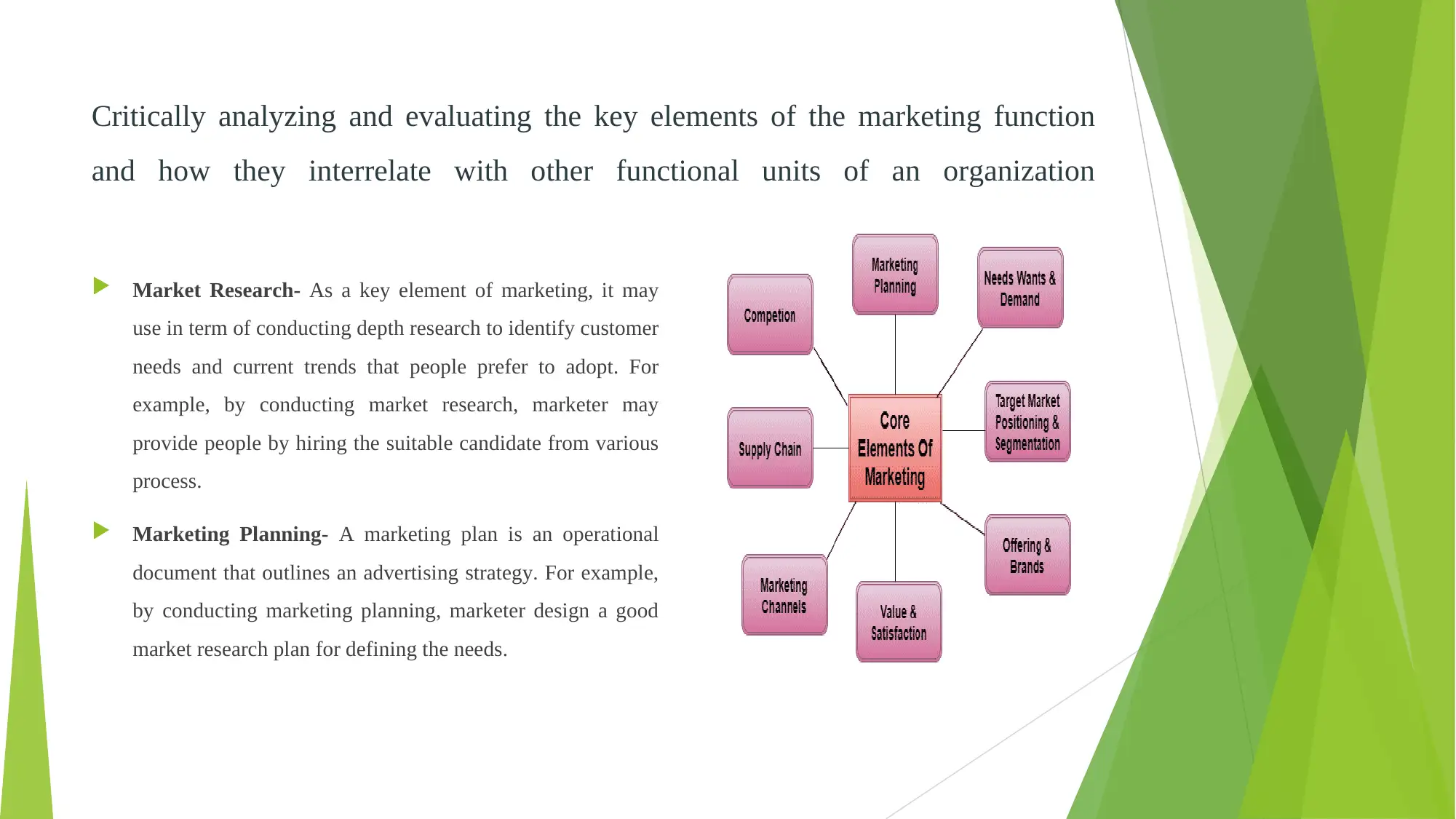
Critically analyzing and evaluating the key elements of the marketing function
and how they interrelate with other functional units of an organization
Market Research- As a key element of marketing, it may
use in term of conducting depth research to identify customer
needs and current trends that people prefer to adopt. For
example, by conducting market research, marketer may
provide people by hiring the suitable candidate from various
process.
Marketing Planning- A marketing plan is an operational
document that outlines an advertising strategy. For example,
by conducting marketing planning, marketer design a good
market research plan for defining the needs.
and how they interrelate with other functional units of an organization
Market Research- As a key element of marketing, it may
use in term of conducting depth research to identify customer
needs and current trends that people prefer to adopt. For
example, by conducting market research, marketer may
provide people by hiring the suitable candidate from various
process.
Marketing Planning- A marketing plan is an operational
document that outlines an advertising strategy. For example,
by conducting marketing planning, marketer design a good
market research plan for defining the needs.
Paraphrase This Document
Need a fresh take? Get an instant paraphrase of this document with our AI Paraphraser
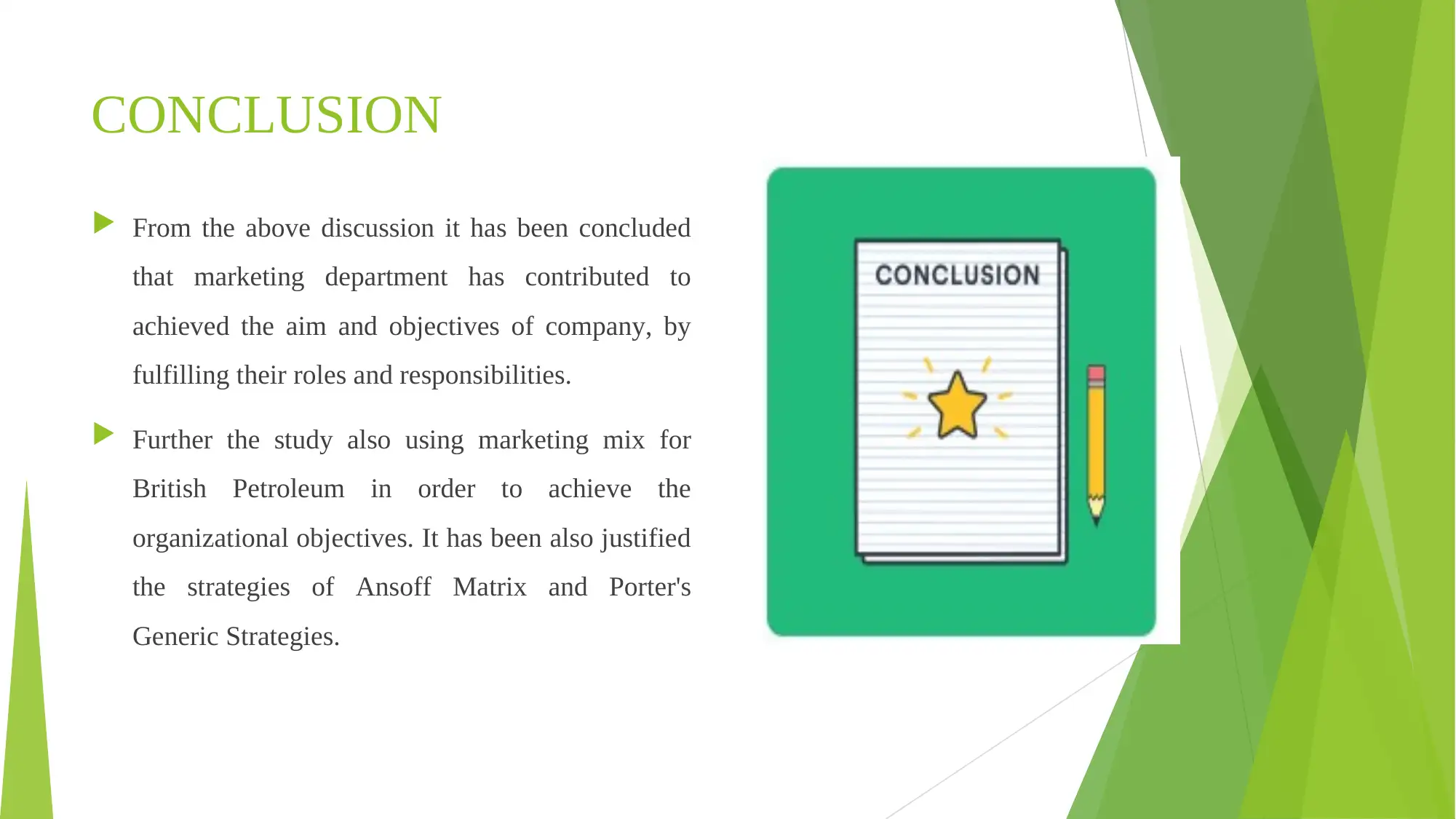
CONCLUSION
From the above discussion it has been concluded
that marketing department has contributed to
achieved the aim and objectives of company, by
fulfilling their roles and responsibilities.
Further the study also using marketing mix for
British Petroleum in order to achieve the
organizational objectives. It has been also justified
the strategies of Ansoff Matrix and Porter's
Generic Strategies.
From the above discussion it has been concluded
that marketing department has contributed to
achieved the aim and objectives of company, by
fulfilling their roles and responsibilities.
Further the study also using marketing mix for
British Petroleum in order to achieve the
organizational objectives. It has been also justified
the strategies of Ansoff Matrix and Porter's
Generic Strategies.
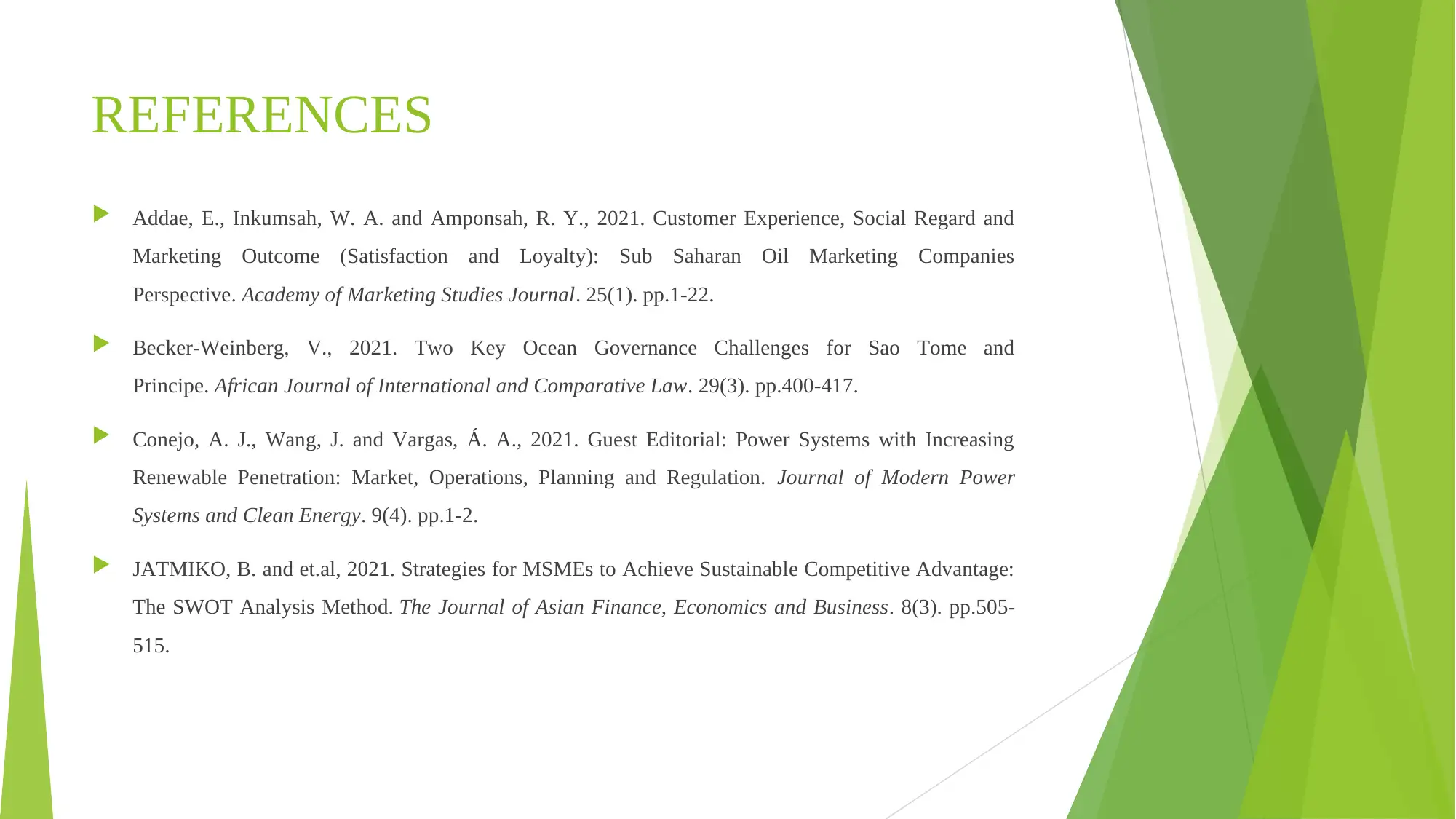
REFERENCES
Addae, E., Inkumsah, W. A. and Amponsah, R. Y., 2021. Customer Experience, Social Regard and
Marketing Outcome (Satisfaction and Loyalty): Sub Saharan Oil Marketing Companies
Perspective. Academy of Marketing Studies Journal. 25(1). pp.1-22.
Becker-Weinberg, V., 2021. Two Key Ocean Governance Challenges for Sao Tome and
Principe. African Journal of International and Comparative Law. 29(3). pp.400-417.
Conejo, A. J., Wang, J. and Vargas, Á. A., 2021. Guest Editorial: Power Systems with Increasing
Renewable Penetration: Market, Operations, Planning and Regulation. Journal of Modern Power
Systems and Clean Energy. 9(4). pp.1-2.
JATMIKO, B. and et.al, 2021. Strategies for MSMEs to Achieve Sustainable Competitive Advantage:
The SWOT Analysis Method. The Journal of Asian Finance, Economics and Business. 8(3). pp.505-
515.
Addae, E., Inkumsah, W. A. and Amponsah, R. Y., 2021. Customer Experience, Social Regard and
Marketing Outcome (Satisfaction and Loyalty): Sub Saharan Oil Marketing Companies
Perspective. Academy of Marketing Studies Journal. 25(1). pp.1-22.
Becker-Weinberg, V., 2021. Two Key Ocean Governance Challenges for Sao Tome and
Principe. African Journal of International and Comparative Law. 29(3). pp.400-417.
Conejo, A. J., Wang, J. and Vargas, Á. A., 2021. Guest Editorial: Power Systems with Increasing
Renewable Penetration: Market, Operations, Planning and Regulation. Journal of Modern Power
Systems and Clean Energy. 9(4). pp.1-2.
JATMIKO, B. and et.al, 2021. Strategies for MSMEs to Achieve Sustainable Competitive Advantage:
The SWOT Analysis Method. The Journal of Asian Finance, Economics and Business. 8(3). pp.505-
515.
⊘ This is a preview!⊘
Do you want full access?
Subscribe today to unlock all pages.

Trusted by 1+ million students worldwide

1 out of 10
Related Documents
Your All-in-One AI-Powered Toolkit for Academic Success.
+13062052269
info@desklib.com
Available 24*7 on WhatsApp / Email
![[object Object]](/_next/static/media/star-bottom.7253800d.svg)
Unlock your academic potential
Copyright © 2020–2026 A2Z Services. All Rights Reserved. Developed and managed by ZUCOL.




